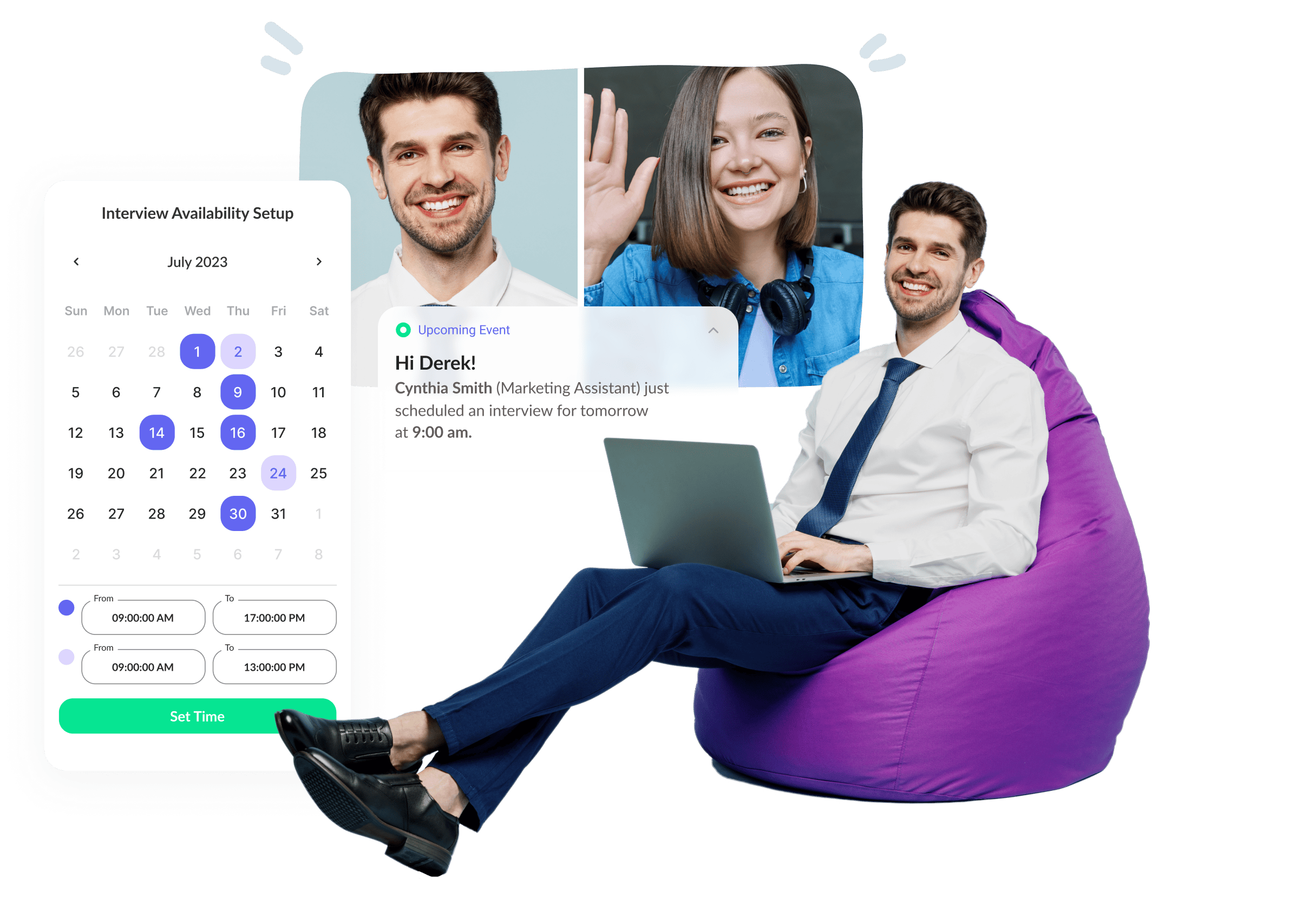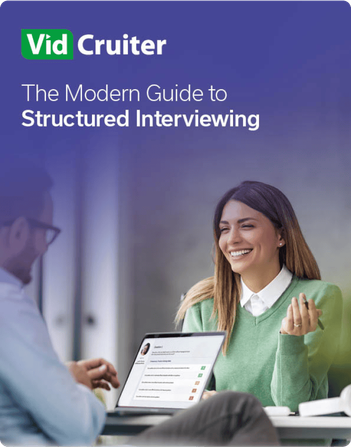
Interview Training for Hiring Managers
Provide interviewers with the tools they need to lead the interview process and hire successful employees.

Interview scheduling is often the first point of contact employers have with candidates, and it’s crucial to creating a great candidate experience from the start. With the right process, you can streamline scheduling to make it simpler for the hiring team and candidates.
Interview scheduling is more complex than it seems. It’s a process where recruiters, talent acquisition, or HR coordinators/specialists quickly and efficiently set up interviews with candidates. Scheduling interviews takes place multiple times throughout a candidate’s journey and can involve a lot of back and forth.
Depending on the hiring process, scheduling might start at the screening step (in the form of screening interviews) or immediately after. Scheduling interviews can take up a lot of time and create a lot of work because it involves coordinating with interviewer schedules and communicating back and forth with candidates.
In a structured interview process, the hiring team plans every step before scheduling starts. In semi-structured or unstructured processes, planning happens on the fly, which makes things more flexible. The less structured the process, the greater the risk that timelines get dragged out and the interview schedule becomes more challenging.
Life happens, and accommodating cancellations, no-shows, and rebooking is all part of scheduling too. Allowing candidates to self-schedule using software for interview scheduling is becoming an increasingly popular option.

No more scheduling interviews for candidates
One-way interviewing doesn’t require scheduling – you’ll need to send candidates an invitation link, but it’s up to them to record their answers before a deadline. Then raters review the interviews on their own time and make decisions promptly.

It’s highly recommended you plan the hiring process for the job position before scheduling interviews. It’s hard to know where you’re going without a roadmap, especially when you’re trying to answer questions and communicate details with candidates.
Ideally, the process is structured so that every candidate has the same experience before, during, and after interviews. Structured interviewing requires some work to get set up. Still, once you’ve got a process in place, it is easier to bring in new or different interviewers because they can simply follow an interview guide or interview scorecard. These structured elements don’t replace training (or a training guide), but they can improve compliance by providing something to follow.
A predetermined structure is also beneficial for interview scheduling because uniformity and predictability allow you to focus on optimizing every task instead of wondering what comes next.
Increase the predictive validity of your hiring process
If you don’t intend on planning a structured process, focus on planning the most important details:
Interview Scheduling Etiquette Tip #1
Ask interviewers about vacations and days off before posting the job description so there are no surprises. This also allows you to plan ahead and decide if you need a different interviewer or see if you can work around their schedule.
How will you keep track of all your interviewers’ schedules so you can easily book interviews? Get clear on availability and any blackout periods you should be aware of to make coordinating schedules and booking time as easy as possible. This step of interview scheduling is where time to hire can take a hit, so it’s a good place to focus your energy on optimizing.
Here are some manual interview scheduling systems to consider:
For one-on-one interviews
Access the interviewer’s calendar and book interviews (with an added buffer on either end) whenever they are available.
For this system to work, the interviewers must be diligent about blocking off times when they are busy or want to protect.
For panel interviews
Identify a handful of specific days and times all interviewers are available and get them to pre-block their calendars for those days.
It is then up to the recruiter to fill those extended slots, but there’s a chance candidates aren’t available for any of the remaining slots.
With any format
You can get interviewers to provide several dates or time slots in advance to offer candidates on a first-come, first-serve basis.
The downside of this strategy is that it requires a lot of admin work and it may result in adverse impact.
Manual systems work, but if you want to drive efficiency, your best bet is to introduce scheduling automation using software. Interviewers can connect their calendars to the software which allows the scheduler to show only available time slots. Candidates then self-schedule based on what’s available. This software also allows candidates to cancel or rebook up to a certain point beforehand without contacting a recruiter or HR representative.
Interview Scheduling Etiquette Tip #2
There’s nothing worse than getting an email from a candidate saying the interviewer didn’t show up, join the video, or call at the scheduled time. Sometimes things come up, or we have so much on the go we forget to stop and see what we should be doing. Have calendar, email, or SMS reminders for interviewers and candidates to prevent no-shows.
No matter what the details are, there are some core components all scheduling emails should contain.
Email template for scheduling an interview:
Instead of calling candidates, or sending a mass email, automate emails using personalized fields to reduce manual labor, while maintaining a personal feel to the communication.
How to reply to an interview email confirming the chosen time
Whether a candidate has chosen a time, or they’ve confirmed a time you’ve chosen that works for them, it’s important to send a quick follow-up to acknowledge the interview is booked and that you’re looking forward to speaking with them.
If the candidate picked their time, send them a quick email: “Thank you for scheduling the interview” with the date and time included. If they simply confirmed a time, send a similar message: “Thank you for confirming.”
When some participants are in-person, and some are remote, scheduling interviews can pose a different challenge due to technical logistics and maintaining a consistent experience. If you’re using a hybrid arrangement, communicate the details or send the link to the candidate in advance, and troubleshoot your AV setup before the first interview.
There are a few different interview arrangements for hybrid interviewing:
The candidate is in-person, some interviewers are in-person, and some are remote.
The candidate is remote, and the interviewers are in person.
The candidate is remote. Some interviewers are in person, and some are remote.
If you conduct structured interviews, determine how to maintain consistency around the arrangement (who is calling in from where), rating, and recording interviews.
An interview management system can save you time on interview scheduling by bringing everything together in one platform — interview guides, rating guides, interviewing software, and more.
Based on pre-determined availability, some software can even automatically send panel participants materials like profiles, resumes, interview guides, and directions. Everyone gets exactly what they need when they need it, so they can come prepared!

Interview Scheduling Etiquette Tip #3
If you will not be around to set it up yourself, train your interviewers to set up the AV for the hybrid interview and provide step-by-step instructions with photos. It’s not overkill — the candidate experience is on the line. Out of respect for the candidate’s time, things should be ready at least 5 minutes before the interview starts.
Set yourself up for success with these scheduling best practices.

Consider interviewer focus and energy levels when it comes to time of day, especially since these two things can significantly impact interview outcomes.
So, when is the best time for an interview? Mid-morning hiring slots are ideal because they allow people to settle into their workday and avoid being lethargic after lunch. Of the CFOs surveyed by Accountemps, 61% agreed the optimal time to conduct interviews is between 9:00 and 11:00 AM.
When is the worst time to schedule? Avoid booking meetings in the last hour of the day, when mental sharpness is at its lowest.
Implement best practices with help from AI
Want best practices for interview scheduling based on your organization’s data? Interview intelligence can provide customized insights like the optimal number of interviews per hire, number of interviews per day (per interviewer), time of day and day of the week to interview, and more.
Yes, along with the time of day, days of the week should be considered. Even if you allow candidates to self-schedule, limit what days they can select if possible. Avoid Mondays and Fridays if possible, and stick to interviewing Tuesday through Thursday. That way, interviewers and interviewees have achieved momentum in the week, and everyone is more well-adjusted to perform.
The only best practice to keep in mind regarding candidate no-shows is to keep your cool. It’s not personal.
Being stood up can be frustrating, but it’s important to allow candidates to explain themselves. Let some time pass (create a cutoff between 8-24 working hours after the scheduled time) and see if they reach out to explain or rebook. If they don’t, the ball is in your court.
Once the candidate has missed the time, there are a couple of options. You can follow up to ask if they are okay and offer them the opportunity to rebook, or send a rejection email and let them know you’re moving forward without them.
If they genuinely were a good candidate, and you are disappointed to reject them, you can always ask if they want you to keep their resume on file for future opportunities. Unfortunately, eliminating someone because they’ve ghosted isn’t uncommon — move on swiftly and focus on the candidates that did show up.
In a structured process, all candidates must interview with the same people, which means rescheduling a time might be required if the interviewer gets sick or gets held up with something else.
You don’t need to be specific, but let the candidate know that something came up so they remain interested. Explain that the same person interviews every candidate to keep things fair, and they are now unavailable to interview at the original time.
The rest of the message should focus on rebooking.
Because most hiring managers are involved in hiring in addition to their regular duties, they can easily get overscheduled. Recruiters are also notoriously overscheduled. While it may keep the process moving, overscheduling can have serious drawbacks.
So, how many should you schedule in a day? There is no hard and fast answer because it depends. While there isn’t a specific number to keep in mind, it’s a bad idea to book a bunch of interviews back to back (especially if they are conducted by video).
Microsoft’s groundbreaking 2021 study about brain wave activity proved that back-to-back live virtual meetings are stressful. The antidote? Short breaks.
The best way to tackle this issue is by making short breaks between meetings mandatory.
Be wary of decision fatigue
Making many decisions is cognitively exhausting and can lead to decision fatigue, which is when you go with the easiest or ‘default’ option. For example, The Royal Society of Open Science found that if credit officers could replicate the rate of approvals they had in the morning (when people typically make their best decisions), it would’ve amounted to $509,023 in extra revenue for a bank in one month.
Interview fatigue is a real problem for recruiters partly due to decision fatigue.

The best practice is to follow up right away with a concise message. Thank the candidate for attending and set expectations around the next steps (for example, roughly when they can expect to find out if they are moving forward). The interviewer potentially mentioned these details in the meeting, but reiterating them never hurts.
Regardless of your decision on the candidate, closing the loop and sending every candidate a message is imperative.
It’s impossible to give a precise number of hours or days because it depends on when the first interview takes place in your process. Even if you are very eager to interview a good candidate, hold off on sending out invitations until you’ve finished the previous step of the process. Waiting until the shortlist is complete keeps things fair and allows you to send candidate communications out in batches.
If you are trying to improve time-to-hire, the faster you can screen or schedule the initial interview after screening, the more you stand a chance of improving this metric.
Interview schedules are very similar to interview guides. They’re documents that detail the process and encompass all the interview’s details, including the questions and rating guides.
Companies typically use unscheduled, walk-in interviews for volume hiring. A scheduled interview is pre-planned and more formal.
A self-scheduled interview is when the candidate selects the best time slot for them using an online interview scheduling tool. The interviewer’s availability is pre-loaded into the platform, so there’s no need for back-and-forth coordination to find a time and day that works. It can also be called on-demand candidate scheduling.
Here are a few of the main benefits of using a platform that supports interview self-scheduling:
Consider your organization’s job interview scheduling process and list what features are need-to-have and nice-to-have.
Here are some standard features that interview schedulers have:
The best interview scheduling software for your organization is a solution that elevates your current process and helps you improve your hiring KPIs.
There isn’t one ‘right’ way to schedule, but there is software that automates the scheduling process, integrates with an Applicant Tracking System (ATS), and allows candidates to self-schedule based on interviewer availability. Using automation, this software helps increase the quality and frequency of candidate communication while decreasing time spent on admin work.
Online interview scheduling tools generally accommodate all formats, including hybrid, panel, group, one-on-one, and more.
These tools can display pre-set availability, but they can also sync to the interviewer’s calendar and display up-to-date time slots. This prevents double booking and allows job seekers to choose when works best for them.
Once an interview is booked, the scheduling tools can automatically send the candidate, and interviewers customized emails, reminders, and other notifications. You can also set parameters and allow candidates to book or reschedule, eliminating back-and-forth messages and last-minute cancellations.
There are several touchpoints you can automate. Here are a few examples:
Request to book an interview
“Thanks for applying! Please book your interview.”
Interview schedule email reply
“Thank you for scheduling the interview at (date).”
Reminder messages
“Reminder: Your interview’s coming up on (date).”
Post-interview follow-up
“Thank you for interviewing, here are the next steps.”
Using software to schedule interviews is best because it greatly reduces manual admin work, empowers the applicant, and frees up your time to focus on other tasks.

E-BOOK
The Modern Guide to Structured Interviewing
Get your free copy of VidCruiter’s comprehensive white paper about structured interviewing. This practical guide:
By providing email address, you agree to receive
updates from VidCruiter.
Read our
Privacy Policy
Modernize your hiring process with expert insights and advice.